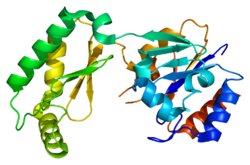| PMM2 deficiency | |
|---|---|
| Other names | Carbohydrate-deficient Glycoprotein Syndrome (CDGS) Type Ia, Congenital Disorder of Glycosylation (CDG) Type Ia,Phosphomannomutase Deficiency [1] ,Jaeken Syndrome, PMM2-CDG , CDG1a |
 | |
| PMM2 protein | |
PMM2 deficiency or PMM2-CDG, previously CDG-Ia, is a very rare genetic disorder caused by mutations in PMM2 . It is an autosomal recessive disease that is the most common type of congenital disorder of glycosylation or CDG. [2] PMM2-CDG is the most common of a growing family of more than 130 extremely rare inherited metabolic disorders. [3] Only about 800 children and adults have been reported worldwide. [4]